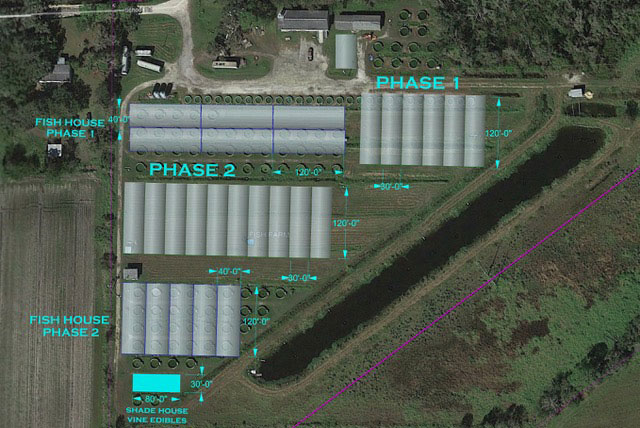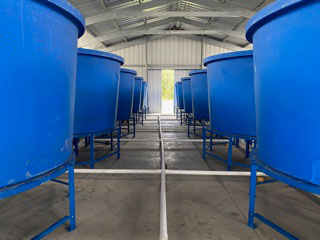
Mention Norman Borlaug to Angela TenBroeck, the mayor of Marineland and a fourth-generation farmer, and she lights up: “Let me just tell you, I hope to be the Norman Borlaug of controlled environment agriculture,” she says. “If you understand Norman Borlaug, you understand my mission.”
Borlaug, the 1970 winner of the Nobel Peace Prize, originated the “green revolution” by transforming wheat into a high-yield, highly adaptive crop and applying more efficient farming techniques. His work saved billions of people from hunger. TenBroeck, head of the non-profit Center for Sustainable Agricultural Excellence and Conservation, sees aquaponics–the combination of co-dependently raising fish and plants without depending on ground soil or chemicals, using fish waste as fertilizer–to be the next green revolution.
She sees it as an essential step toward sustainability, repairing the planet, and ending hunger. TenBroeck is putting the practice to work in Northeast Florida, starting from Worldwide Aquaponics, the company she heads and that’s centered on a 30-acre farm on School Road in East Palatka. From there, it spawns replicas. In the last year and a half, her operation, pushed some 2.2 million pounds of produce into Flagler, St. Johns, Putnam, Duvall, Nassau, and Clay, counties.

“We could put these farms all over the world. And in places we have figured out how to run them without pumps, with a low water you know, hydraulic head using old physics principles,” TenBroeck says. “Grow food like we’ve never grown food before, that’s high quality, lasts longer, tastes better, chemical free. And we can do this very simply. Yes, it costs a little bit of money to get it started. But once you get it started, and the people get to run it, anybody can do it. And that’s the thing that was so special about what Norman Borlaug did, was that he was able to take the wheat and those things and make it adapt for the environment. And that is, in fact, what we have done here. We could put these low-tech greenhouses all over the world, no matter the environment. We changed some things, we make the wall heights different, and we are able to change the way people access food.”
She’s catching notice. In 2020 she won a Florida Blue Foundation’s food-insecurity challenge grant with her concept-turned-reality of produce-vending machines, intended to counter the dearth of fresh, healthy produce in food deserts, which disproportionately affect poorer neighborhoods and neighborhoods with concentrations of people of color.
On Dec. 13, Florida Agriculture Commissioner Nikki Fried named her Florida Woman of the Year in Agriculture. TenBroeck, 47, will receive the award at a Florida State Fair lunch on Feb. 14 in Tampa.
TenBroeck was driving with her family on a Saturday less than two weeks ago when she got a call from a Miami phone number. “I answered the phone and they asked to speak with me and I went, Oh, no, I got a telemarketer call,” Tenbroeck said. “And the woman said, ‘Well, hello, Ms. TenBroeck, this is Nikki Fried from the Commissioner of Ag,’ and I thought, Okay, this is a prank. And she said, ‘You know, I’m calling to be the first to congratulate you on being nominated and awarded Florida Ag Woman of the Year. And, you know, we’d like to celebrate you coming in Tampa in February and my PR crew will be in touch with you.’ I said, can you say this again? I’m going to put you on speakerphone so my family can hear you. I’m a jokester, people sometimes don’t think I’m telling the truth. So I wanted them to be able to hear that and so my family heard it and cheered.”
Then she felt the weight of the award, or at least its import. “It’s kind of a big thing you know, I mean, I’m just–we’re just farmers. And somebody’s saying that you’re the Woman of the Year, and farming, in this day and age, is kind of interesting, because farming is traditionally a male dominated profession.”
“I would say this is very helpful to the County, more recognition for us from that sector of the economy,” Al Hadeed, the county attorney, wrote county commission members on learning of the award–and to let commissioners know, as the announcement had gone largely unremarked locally.
TenBroeck–the name is Dutch, and was her late husband’s (he died in 2008); her family is Western Band Cherokee, from Oklahoma following its dispossession by U.S. troops in North Carolina–grew up in Jacksonville, where her great grandfather had started indoor farming, back when it was “considered hocus-pocus,” she says. He had worked on small farm lots. But he wanted to do something different. He was working for the Winn-Dixie company, which was in need for high-quality tomatoes. He started with beefsteak tomatoes. TenBroeck worked on the farm but “was the family’s person to go to college.” She then went to work in Duval County public schools, “re-missioning” three schools where she taught mainly in middle school through innovative curriculums focused on students interested in professionalizing in medicine or coastal sciences. (Think of Flagler County’s flagship-style programs, but extended to an entire school.) Around 30 percent of her students are now doctors, she says.
“When I worked in medicine, what I noticed was people were sick because of bad water and bad food. And so as I progressed in my thoughts and my tinkering, I was able to figure out ways to grow food differently.” Working with another family starting in 2012, she launched Traders Hill Farm aquaponic system. The company by 2017 had expanded by 600 percent. She sold it “to kind of do my work around the world.” A public speaker when the mission requires it, TenBroeck can speak of farming innovations’ benefits almost like an evangelist, with no limits to what could be achieved. “I believe that we can solve hunger and nutrition issues by building farms, what I call hyperlocal. So we believe that hub-and-spoke farms are the way to go. The small family farms are the way to go,” she says. And these farms can go anywhere, in urban or rural environments “to be able to give communities the opportunity of the highest quality freshness available produce that someone can get from all local farms. So we aggregate from ourselves as well as from our brother and sister farmers around us to be able to push produce into the communities.” Ground farmers are not excluded from the network as long as they use sustainable techniques. The operations are tied to school districts and hospitals, which benefit from the produce.

TenBroeck says her claim to fame is the development of a system that transforms fish waste “that we transition through a bioreactor that is proprietary to us, that allows us to make soil water and grow food differently for the masses,” she says. The East Palatka farm has 31 outdoor fish tanks, each of 3,000 gallons, plus 18 indoor tanks. (Fish–tilapia and koi–is raised in the indoor tanks, then taken to the outdoor tanks when it’s preparing to go to market. In the future shrimp and hybrid striped bass will be raised too.)
Her initiatives–there’s a maze of them–pair entrepreneurship with a social mission. One of those is to channel “reemerging citizens”–formerly incarcerated individuals, veterans, people in recovery, women starting over–into the farming enterprises.
The farm in East Palatka itself emerged out of these ideas. TenBroeck first arrived as a consultant, then became majority owner in 2019. The workers at the farm are short of housing, herself included. She was connected to Jim Jacoby, the Atlanta-based developer with deep ties to Marineland (he once owned the dolphin attraction there) and Palm Coast. He offered housing for TenBroeck and her workers in may 2020. The workers eventually found places elsewhere. TenBroeck stayed, joined the Marineland City Commission, and was eventually named mayor. She has no intention of leaving the town (pop. 12). “Jim and I talked a long time about how to make Marineland a more scientific habitat, kind of as a live, work, play for scientists,” she said. That may be a more distant ambition.
Farming is not. “I believe that we can solve hunger and, you know, nutrition issues, by building farms, what I call hyperlocal,” she says. “All I can say to you is that, I know that we can grow high quality foods, I know that we could put a facility and then we could have people who want to come in and learn. And so we just have to be mindful of that. We have to do this in a way that’s logical and sustainable. That’s really my plan. We are specially positioned to do some stuff differently.”
![]()





























Joan says
What an exciting endeavor! The world needs both people and ideas/efforts like this. Congratulations Ms. TenBroeck! This is well deserved recognition for what can change the outcomes for so many. Thank you!
Jennifer M Wilson says
What! Congratulations Angela! I had no idea I was sitting next to such a celebrity! Your ambition is to be admired! Glad I met you. Merry Christmas. Sounds like you will have an awesome 2022! Jennifer
Gail says
Congratulations Angela I have known you since you were a child and knew that you were special and always cared about others. I told you that you could do anything you put your mind to and you’ve made a wonderful contribution to help everyone and improve our planet. I’m very proud of you keep up the good work. Great article you certainly deserve the recognition.
Gail
Carol Coren says
Northeast Florida is lucky to have a visionary and capable farmer entrepreneur like Angela Tenbroeck as a resident, farmer and social enterprise entrepreneur. She always thinks about triple bottom lines: profit is with little purpose to her if it is not attached to advancing opportunities for people and improving the prospects for the planet. Kudos to the state for recognizing her accomplishments and for acknowledging the role that Controlled Environment Agriculture now plays in keeping Americans well fed.